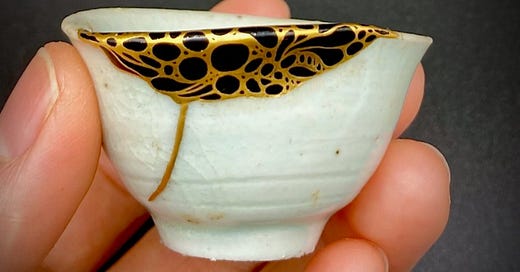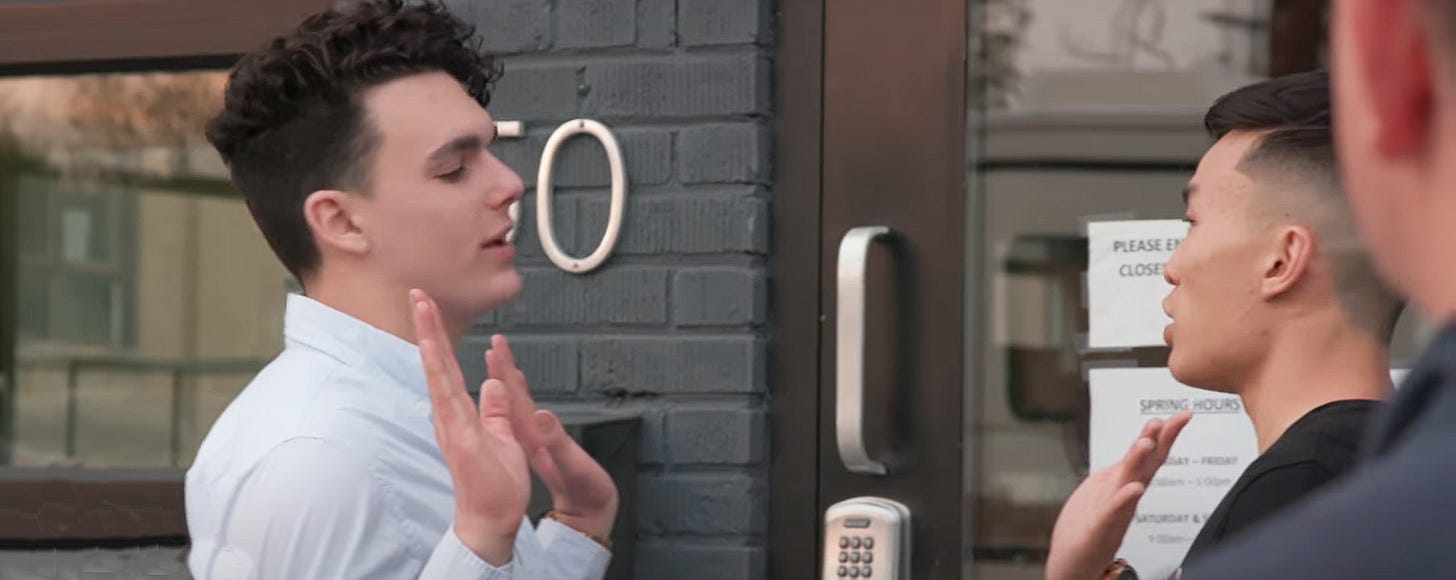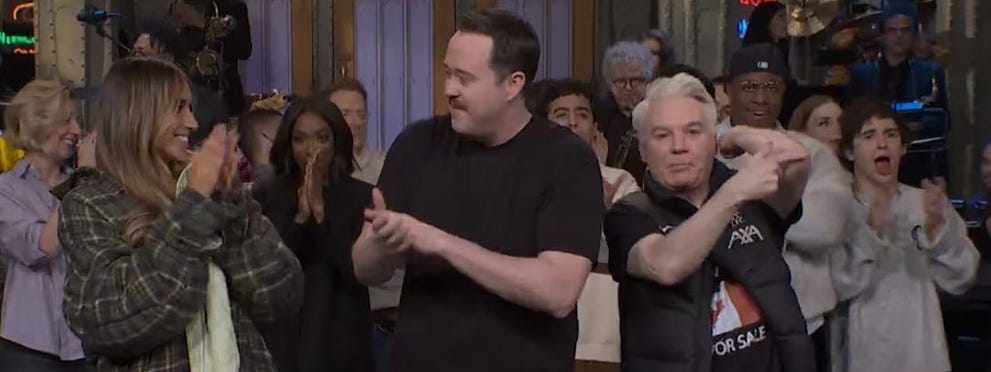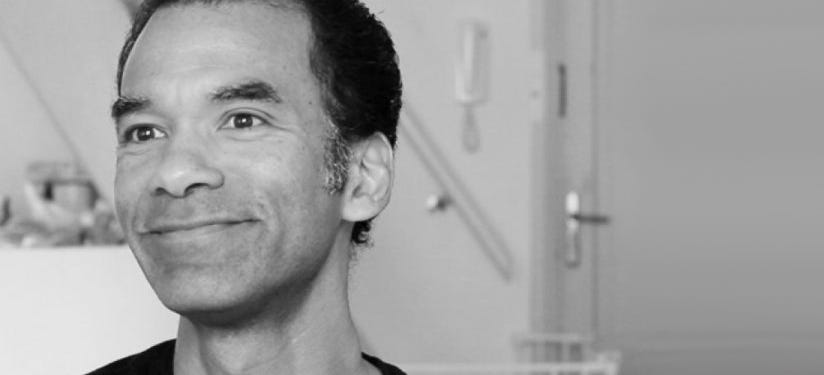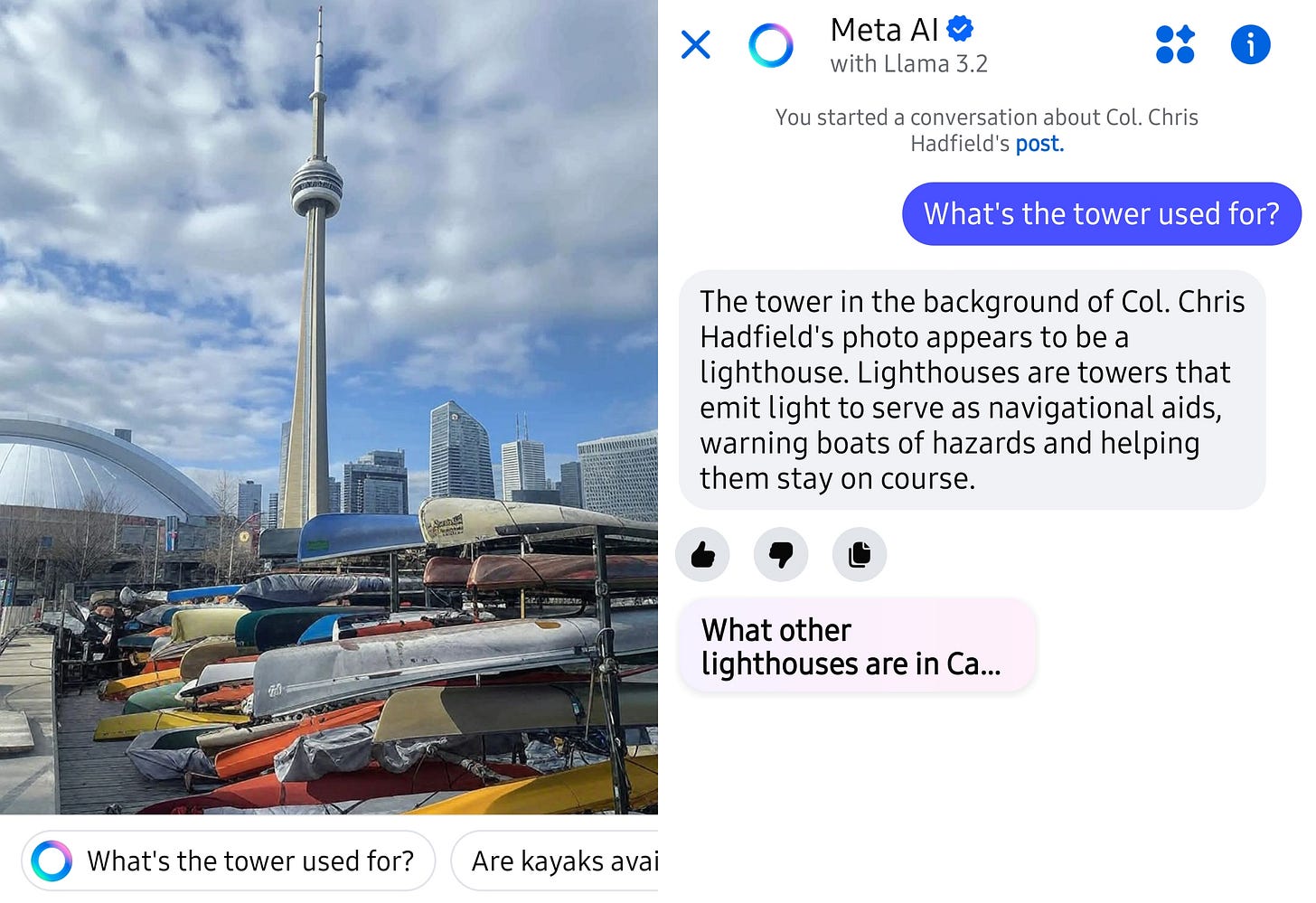Tumblr is back, Meta is whack, and Greenpeace goes Ghibli
Sorry, not sorry
Politeness is stereotypically Canadian. I was definitely one of those toddler parents who told their kids to “say please” before handing anything over or to “say sorry” if they hurt someone. It's easy to find online merchandise that features the phrase “Sorry, eh”, and the Canadian standoff is a comedy trope.
Brits are also renowned for excessive apologizing. An English friend of mine (called Simon, naturally) used to say, back when he was a McGill undergrad, that his best pickup line was an exaggerated “I’m terribly sorry!” after bumping into a young lady in a bar.
There must be cultural reasons why Americans are brash, Brits are self-deprecating, and Canadians are… what, exactly? Just plain nice? This intro isn’t the forum for an in-depth analysis, but superficially, I’d say these traits are a complicated outcome of each country’s historical role within the British Empire.
(By the way, “nice” was an adjective that my English teachers told me never to use because it was too vague. But I like “nice” because it’s vague. We all know what it means, deep down inside. And I think it captures a range of human behaviour that more specific terms, such as “decent” or “gracious”, might miss.)
Okay, so Canadians are nice. But current political circumstances are forcing the inhabitants of the Great White North to question whether it’s an effective strategy to be nice to a bully or to stand up to one. It turns out, there’s a middle way. The hockey-inspired phrase “elbows up” has been quoted time and again in recent weeks to inspire Canadians to adopt a sort of spiky guardedness in the face of unwarranted aggression. It’s the porcupine defence: if you hurt us, you're gonna get hurt, too.
Survey results published this month by polling firm Narrative Research revealed that Canadians' stress levels are rising along with the cost of living and global uncertainty, leading to a perceived increase in rudeness towards fellow citizens. However, in the same way that all drivers think they’re better than average, everyone thinks that it’s other people who are the problem: “Interestingly, residents don’t generally feel that they, themselves, are becoming ruder, but rather it is something they are noticing in others. Just over half of Canadians say their own politeness has not changed, compared to a quarter who think they are becoming less polite.” Funny, eh?
Politeness may be at the heart of the so-called “culture wars” that are propelling societal turmoil and contentious policies. Being polite means being nice to other people, and that involves making efforts to avoid accidentally offending them. Conservative-minded folk believe that “you can’t say anything these days” (due to the risk of offending), while liberals are excessively inclusive in their language (due to the risk of offending!). Everyone on the political spectrum agrees that causing offence is the issue, but one side says “Screw it, I can’t handle the mental gymnastics!” while the other says, “I’m an empathy-fuelled mental gymnast!” Either way, to quote Elton John, sorry seems to be the hardest word and is to be avoided at all costs.
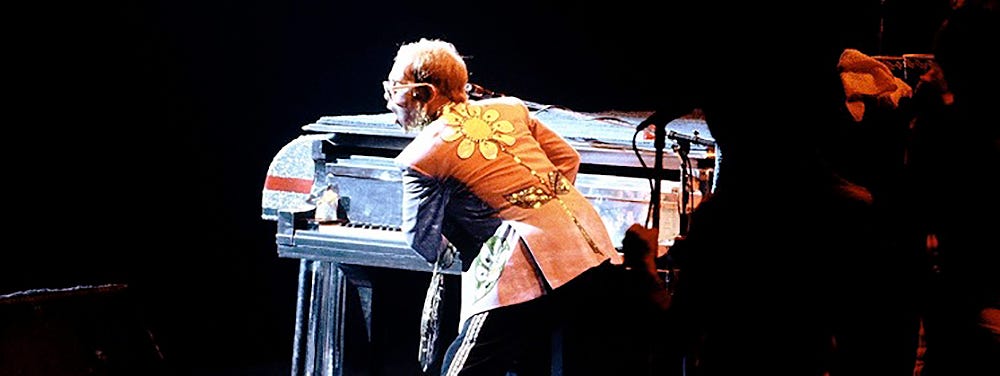
Many people have a viscerally negative reaction to apologizing. It’s seen as a sign of weakness. To me, the ability to apologize sincerely is a sign of psychological strength. If your personal identity and social standing depend on never saying sorry, well, you're on a truly flimsy foundation. In other words, only the emotionally puny never apologize.
Being polite isn’t just about saying sorry. Whether we’re being more rude to each other these days or not, one place where there’s evidence of an excess of politeness is the prompting of chatbots. Sam Altman, the CEO of ChatGPT owner OpenAI, responded to a question on X last week that adding “please” and “thank you” to chatbot queries costs OpenAI tens of millions of dollars in electricity annually.
It’s sad to contemplate that people might find it easier to be polite to a virtual person than a real one. But if chatbots encourage us to be nicer in digital spaces, maybe there’s hope that this newly learned politeness will translate to interpersonal communication. Or maybe I’m being ridiculously optimistic. In which case, I'm sorry.
Tumblr goes up in the world
Gen Zs crave “old internet energy,” as Tumblr’s front page boasts, and are flocking back to the platform that had its original heyday in the 2000s. But what is “old internet energy”? Firstly, Tumblr is gentler on the attention span compared to other platforms, with photo or text-based posts, and a front page that actually ends, unlike Instagram’s infinite scroll of short-form videos. Gen Zs crave a sense of control over their own attention spans, shown also by increasing interest in “dumb phones”— cellphones that can only be used for calling or texting, which eliminates doomscrolling.

Secondly, Tumblr content revolves around personal art and shared fandoms, while Instagram is increasingly dominated by lifestyle influencers who make content that is often both performative and revealing. But Gen Zs value privacy, according to a study done by Gen Z-focused research firm DCDX. Enter Tumblr, a platform with a distinct lack of selfies, lending people the freedom to explore identities, art, and ideas without their faces attached for the world to see. It’s not just Tumblr that satisfies Gen Z’s need for less ephemeral stimulation and more in-depth, anonymous content—Yahoo and Napster are also attracting attention. A trend towards what benefits users, not corporations, is fuelling this tumble back to the old internet.
Greenpeace goes Ghibli
The recent trend of using an AI filter to turn photos into ersatz Studio Ghibli images has received heavy criticism, most incisively from the legendary studio's co-founder Hayao Miyazaki, who labelled it “disgusting.” Ignoring this barb from the beloved animator, Greenpeace decided to riff on the online trend earlier this month by Ghiblifying photos of environmental calamities with the caption: “No filter can beautify the ugly truth of the climate crisis.”
It was an interesting take on a polarizing fad, although surely it involves an underlying contradiction. Why make ads about the climate catastrophe using AI, a product that increasingly damages it? Attracting attention is fine, but it all comes across as hypocritical. Not to mention that disregarding the wishes of Hayoa Miyazi, the artist who originally made this art and wants the trend to end, lacks class and taste. The creatives behind the campaign could have executed it with more respectful art direction if the ultimate goal was to encourage us to respect the environment.
Lunchbox notes go AI
Have you ever wanted to leave a sweet note in your child’s lunchbox, but weren’t able to find the right words? Or maybe you weren't feeling the love on a dark winter's morn with screaming kids? Welch’s has got your back, with the Lunch Box Notes Translator, an LLM that sweetens up messages destined for the new blank space on Welch’s packets.
For example, “Have a great soccer game” (lacklustre, uninspired) is transformed to “Kick it like a champ and have an awesome game” (clever, edifying) by Welch’s Translator. The tool, for some reason, is only available for a limited time, so make sure to check it out if you don’t have access to ChatGPT, Gemini, or your own feelings.
Jeffre Jackson, senior strategist
“One of the first things I noticed about interestingness was a focus group showing people ads and they get this look on their face which is a combination of frowning eyebrows and smiling mouth, as if they’re working on something and they know it’s gonna be satisfying once they get to it.”
I pulled this quote from an interview on previous 1Qi guest Adam Morgan’s Let’s Make This More Interesting podcast. The subject? Interestingness, and why it matters more for effective advertising than humour or entertainment. If you present an image or story that contains some kind of tension, mystery, or incongruity, the viewer’s mind will engage with it because it’s interesting. This increases the odds that your brand or message will be remembered and improves the perception that it is valuable. Too many brands play it safe and too many ads opt for lists of features. This typically results in a giant waste of time and money. To get a better return on your marketing investments, choose interesting!
Imperfect beauty
Naoko Fukumaru is a Japanese art restorer and conservationist who has worked in England, the US, and now Canada, where she also produces stunning artworks by magnifying imperfections in broken objects to create a new dimension of esthetics.
Fukumaru’s work is a contemporary version of Kintsugi, the 500-year-old Japanese method of repairing broken ceramics using tree sap dusted with gold powder to highlight, rather than hide, restorations. After leaving an abusive marriage, Fukumaru began “filling my emotional breaks with gold” and celebrating imperfection and impermanency.
Fukumaru says, “My artwork aims to open people and to encourage self-acceptance, to help heal ourselves and the world. Suffering and flaws are integral parts of our identity, elements that shape our history and uniqueness. By beautifully magnifying imperfections in objects, my work allows us to accept fragility and imperfection in ourselves and in life.”
Where’s Waldo? And Wendy, William, and all your other friends…
If you’re an iPhone user, you have access to an app called Find My, which allows you to share your location with friends and family. For some, the ability to know when someone is nearby is a positive. For others, it’s a nightmare.
This episode of Endless Thread from WBUR, Boston’s NPR station, explores what it means to willingly submit to constant surveillance. How do different age groups view the ability to visualize their social circle at any time, and in return to know that others know where you are? One interviewee explains that after her boyfriend moved out and she was living on her own for the first time, Find My provided comfort because she knew that her friends would be able to track her down if her movements or whereabouts attracted suspicion.
Privacy not only means different things to different people, it means different things in different cultures and periods. In most times and places, voluntarily disappearing isn’t an option, due to crowded living conditions or the social acceptance of simply dropping in on your neighbours unannounced. Did mid-twentieth-century ideals such as single-family home ownership and technologies such as the television shape our expectations of local community so that digital products like Find Me solve a problem for certain people while prompting a wave of social awkwardness for others?
Is AI getting less I?
You know how you see random posts from people you don’t know in your Facebook feed? Former astronaut and proud Canadian Chris Hadfield recently posted a pic of the CN Tower, a Toronto landmark and formerly the world’s tallest structure. Meanwhile Meta has started to deliver unsolicited AI prompts underneath posts, including this one. I imagine that they are intended to add context or additional information to the subject of the post. So I finally decided to click one of the suggested prompts as an experiment. The answer is on the right.
One of the most iconic buildings in North America is utterly misrepresented by Meta’s supposed “intelligence”. What’s the message here, folks? Do not trust AI! Use it, by all means, but double-check its answers. Because if it can get this so flagrantly wrong, it can get anything wrong.
Did you enjoy this issue of Discomfort Zone? You can comment directly in the Substack app or drop me a line by emailing me at john@johnbdutton.com.
And why not connect with me on LinkedIn if you haven’t already?
FOMO food research and writing by Silvia Todea, editing by John Dutton.
Legal disclaimers:
All images in this newsletter that are not the property of the author are used with permission or reproduced under the fair use provisions of the Canadian Copyright Act while giving appropriate credit.
The content published in this newsletter represents the private views and opinions of John B. Dutton and are not in any way connected to his role with the National Film Board of Canada.


